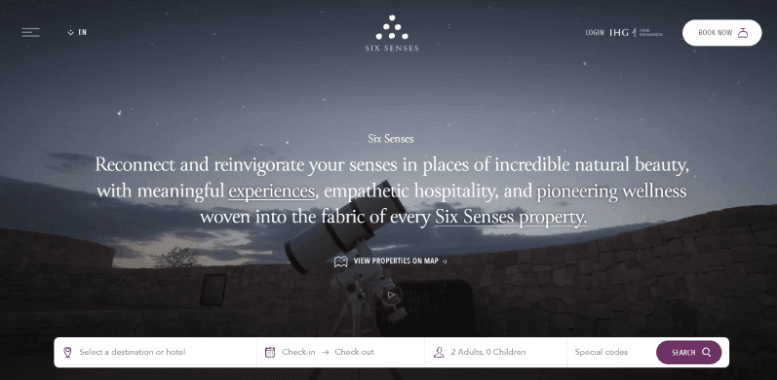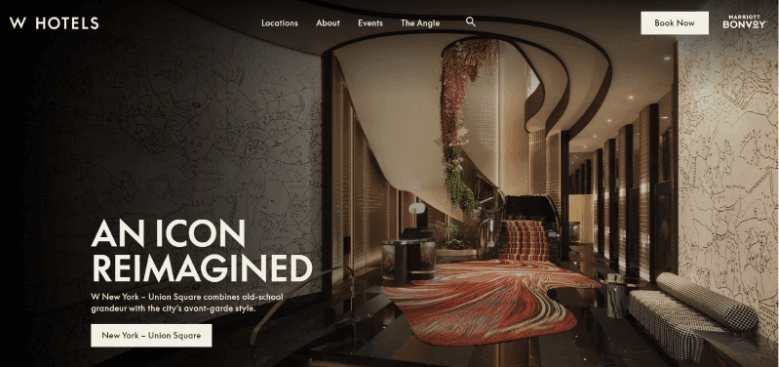Hotel branding goes beyond your name and your logo. It’s about communicating a set of values to your users, bringing the intangible elements of your business to the center stage.
Studies have shown that Millennials and Gen Z are particularly influenced by the “why” behind a brand. This means that brand purpose is a key factor in their buying decisions. Good branding helps create a lasting impression on your target audience, letting them know what to expect from your brand and how to distinguish your hotel from competitors.
In addition to choosing the right hotel property management software, investing in hotel branding is one of the most important decisions you can make as a hotelier. So, let’s explore what hotel branding is, why it’s so important, and how to build an effective branding strategy. We’ll also look at some great examples of successful branding.
What is hotel branding?
Hotel branding in the hospitality industry 2.0 is more than just choosing a name, logo and a key value proposition. Nowadays, with the advent of social media, a proper strategy needs to encompass storytelling in order to not only define your values, but also communicate them. In this way you can build a reputation based on your value proposition.
In order to convey this comprehensive message, it’s important to know who your customers are, study your competitors through benchmarking and competitor research, and create a strong core philosophy that defines who you are as a hotel.
Is your key value proposition that you are eco-friendly? Choose colors and a look and feel that highlights these values, such as natural earthy colors and leaves, for example, in your logo. Then choose a brand name accordingly and make sure your logo ties it all together.
Or do you want to brand yourself as luxury? In this case, you want to choose clean fonts, talk a lot about the services you provide, and create visuals that communicate this luxury concept. It’s not enough just to say “we offer luxury” – you need to show it.
An effective branding strategy is about creating a reputation and an emotional connection through your tone of voice, the font you choose, the photographic style of the images and the stories you tell. This must be transferable among a wide target audience across different segments, business travelers, casual tourists, alternative travelers and cultural tourist likes. It’s all a series of choices that will help define who you are as a hotel.

Why is hotel branding important?
Creating a strong narrative for your hotel and a guiding philosophy that differentiates you from the others is paramount to connect with your guests and make them choose you over the competition.
An effective brand strategy allows people to remember you and distinguish you from the rest of the hotels. The emotional connection that is created through storytelling is what leaves a lasting impression on your guests. Ultimately people buy experiences, and furthermore, research shows that many decisions are driven by emotions rather than logic.
Hotel branding also helps to establish trust. By being consistent in your messaging, you can stand out from others and create a bond with your potential clients, encouraging them to be repeat customers. Plus, creating relationships with your guests via social media pre-stay, during the stay and post-stay, is key to encouraging word of mouth. The better the imagery, the videos and the branding, the more likely people are to share their experience on social media and your brand can grow exponentially with little investment.
Most important elements in hotel branding
Hotel branding is made up of several key elements like your logo, storytelling, visual identity, values, and offerings. Together, they define who you are and who your target market is.
Your logo and visual identity
Your brand’s logo is a major part of your brand’s visual identity. It visually represents your brand’s name, values, and personality. Imagine your hotel’s main value proposition is sustainability in the countryside. You might incorporate natural elements like a green leaf, a tree, or even a flowing river to symbolize your commitment to the environment. The color palette could include earthy tones like greens, browns, and blues to evoke a sense of nature and tranquility. This cohesive visual identity helps guests immediately associate your brand with sustainability and the serene countryside.
Storytelling
While a logo is how you connect visually with potential guests, storytelling is how you connect emotionally and create a lasting bond between your brand and potential guests. The stories you tell should reflect your brand values in an authentic way. For instance, you could share stories about your eco-friendly practices, such as sourcing local, organic produce for your restaurant or initiatives to reduce plastic waste. These narratives not only highlight your commitment to sustainability but also resonate with guests who value environmental responsibility.
Your values
Storytelling is a great way to communicate your values, which are at the core of your brand’s identity. These values should be evident in all aspects of your branding and guide both your daily decisions and long-term goals. For example, if sustainability is a core value, it should influence everything from the materials used in your hotel’s construction to the types of amenities you offer, such as biodegradable toiletries or energy-efficient lighting.
Your offerings
What your hotel offers—whether it’s amenities, spa treatments, a Michelin Star restaurant, a pool, or a private beach—should align with your brand’s proposition. This helps shape guests’ perceptions of your brand and shows how your offerings are part of your commitment to excellence. For a hotel focused on sustainability, this might include offering eco-friendly spa treatments, farm-to-table dining experiences, or guided nature walks that educate guests about local flora and fauna. These offerings not only enhance the guest experience but also reinforce your brand’s commitment to sustainability.
How to build an effective hotel branding strategy
Building an effective brand strategy doesn’t happen overnight, and requires careful thought and attention. Here are some tips to improve your branding strategy.
1. Define your hotel’s philosophy
What do you want people to remember you for? Defining a philosophy should be the guiding principle behind your branding strategy. An important part of your philosophy is to make your values tangible, telling stories and helping to position you in the market while showing the guest journey. Your philosophy is the “why”, the story that will make your potential guests connect with your brand and think “I want to go to that hotel because x, y, and z.”
2. The look and feel
Once you have your hotel’s value proposition in mind, it’s time to choose the look and feel of your brand. This includes the logo and the name. Part of the logo is defining a symbol and a color scheme that represents you, so that this symbol can stand on its own even without the logo, whether it be on social media, corporate documents, business cards or brochures.
3. Location is everything
The location of your property will play an important role in the decisions behind look and feel as well. It’s not the same to choose the look and feel of your brand for a rural location as opposed to a property by the beach. If you’re by the beach, for example, you may want to choose colors associated with relaxation like white, soft nudes and beiges with touches of dark Mediterranean blue to recall the sea. You may also choose to have a wave as your hotel’s symbol to evoke the ocean.

4. Don’t underestimate the power of the name
Choosing the name of your property is one of the most important decisions you’ll make. You might go for a name that reflects the location, like “Miami Suites,” or one that captures the experience you offer, such as “Rural Abode.”
Whatever you choose, the name will play a crucial role in helping clients remember you. Aim for a name that’s easy to pronounce in different languages and is short and catchy. You might also consider a name that’s rich in keywords to boost your hotel’s visibility on Google, like “Mediterranean Escapes” or “Amazon Luxury Suites.” Don’t underestimate the power of a good name. If needed, hiring a naming expert can be a worthwhile investment - you won’t regret it.
5. Partner up
Partnering with local businesses and tourism bureaus is a fantastic way to build connections and reinforce your brand’s identity and commitment to the local community. This not only promotes engagement with locals but also keeps your brand top of mind when visitors come to town. Hosting events to engage the local community? Make sure to team up with influencers who can help amplify your reach.
6. Don’t neglect the environment
Protecting the environment is part of your brand’s social responsibility. With climate change being a major concern, an eco-friendly brand that incorporates sustainability into its daily practices - like reducing waste, using green energy, and contributing to a greener planet - will definitely stand out. Guests appreciate and support brands that are committed to making a positive impact on the environment.
7. Establish ways to keep people engaged
Loyalty programs, brand ambassadors, and social media are fantastic tools for keeping guests engaged. Loyalty programs can encourage repeat visits and foster a deep connection with your brand. Brand ambassadors, on the other hand, can act as advocates, promoting your hotel’s mission and values to a broader audience through social media and other channels. This combination helps build a strong, loyal customer base and extends your brand’s reach.
8. Go for authenticity
Where your hotel is located plays a huge role in shaping your brand identity. A hotel nestled in nature offers a completely different vibe compared to an urban destination rich in local culture and cuisine. By tapping into the unique aspects of your location, you can create more authentic experiences for your guests. This not only enhances their stay but also fosters deeper connections and memorable moments.
9. Create a strong digital presence
The better your hotel can engage an online audience, the easier it will be for them to find you. Consistency is key - make sure your communication always reflects your brand personality. Use SEO and content marketing to drive traffic and build brand awareness. And don’t forget to manage your online reputation. Respond to reviews, engage with followers on social media, and keep your content fresh and relevant. This will help you create a strong online presence and attract more guests.
10. Differentiation is key
If you want to stand out from the competition, it’s key to communicate and design a strategy for differentiation. What do you offer that the competition doesn’t, and how can you appeal to a distinct audience? Identify your unique selling points and make sure they are clear and compelling in your branding and marketing efforts.
How hotel technologysupports your branding strategy
The right hotel technology strengthens your hotel branding with a comprehensive suite of tools that not only streamline operations but also elevate the guest experience – helping your hotel's unique identity shine through at every touchpoint.
Creating on-brand experiences with integrated technology
An efficient property management system simplifies essential operations like reservations, front desk tasks, payments, space management, housekeeping and guest communication. By automating these processes, hotels can deliver a consistent brand experience at every touchpoint, enhancing both operational efficiency and guest satisfaction.
There are countless ways the guest journey influences hotel branding – here’s our CEO Matt Welle sharing how aligning each touchpoint creates unforgettable experiences that foster loyalty and set your brand apart.
For more episodes outlining the four key hotel brand categories and the importance of their customer journeys, head to Matt Talks here.
Value proposition and brand philosophy
Mews enables hotels to clearly define and communicate their core values and brand philosophy through in-app customization as well as seamless integrations with leading CRM and email platforms. This allows for consistent, on-brand messaging across every stage of the guest journey, from personalized pre-arrival emails to thoughtful post-stay follow-ups. The result is a cohesive, memorable experience that builds trust, reinforces brand identity and nurtures lasting guest loyalty.
Customizable guest experience
Mews provides a range of tools that support a fully personalized and seamless guest journey, helping hotels deliver a standout branded experience at every touchpoint. Here’s a glimpse of what a fricitionless branded experience can look like:
- Booking engine
Embed a fully branded, conversion-optimized booking experience directly into your website. The booking engine reflects your hotel’s unique look, feel and tone – offering guests a consistent brand experience from the very first click. Designed for performance, it increases direct bookings, reduces reliance on OTAs and includes built-in upselling options to drive additional revenue. - Digital Key
Enable contactless check-in and secure room access directly from guests’ smartphones. This modern solution enhances convenience, eliminates front desk wait times and aligns with guest expectations for tech-enabled, self-service experiences – especially appealing to digitally savvy travelers. - Digital services
Personalize the guest journey with tools like online check-in, real-time in-stay messaging and automated upselling. These features streamline operations while allowing your hotel to offer relevant, timely touchpoints, such as suggesting upgrades, spa treatments or late check-outs, improving guest satisfaction and boosting revenue. - Operational automation
Mews streamlines day-to-day hotel operations with powerful automation for front desk tasks, payments, housekeeping and reservation management. This reduces the administrative workload on staff, allowing more time for meaningful guest interactions and consistent delivery of service excellence – an essential part of brand perception and loyalty. - Frictionless payments
When payments are embedded, your hotel customers can seamlessly add and pay for extras like spa treatments or room upgrades within your branded experience. This reinforces your hotel’s identity at every touchpoint while driving additional revenue through a smooth, on-brand guest journey. - Marketing integrations
Through Mews Marketplace, hotels can connect with over 1,000 industry-leading apps to enhance guest engagement and marketing efforts. From CRM and reputation management tools to revenue and business intelligence platforms, these integrations support targeted, automated campaigns and personalized guest communication that reinforce your brand identity across all channels.
4 examples of good hotel branding
Now that we’ve looked at how to create an effective branding strategy, let’s look at some good examples of hotel branding.
Six Senses
Six Senses luxury retreats are a great example of effective branding. Their website features a rotating video showcasing the beautiful locations of their hotels. This immediately connects visitors to the sense of place and the experience they will have when staying at a Six Senses property. The logo, with its six dots, invokes the simplicity and luxury of their wellness retreats.

Waldorf Astoria Hotels
Waldorf Astoria Hotels have become iconic through their appearances in numerous films, TV shows, and books. By leveraging product placement and appearing in more than 40 movies, they have established themselves as a landmark of pop culture. This is a prime example of how great branding is achieved.

W Hotels
W Hotels have positioned themselves with a refined sense of luxury. These understated, hip urban hotels host events such as live music series to engage the local population at different locations around the world. Their website is simple, with clear lettering and a bold capital letter logo, giving people a sense of confidence in the brand.

Park Hyatt Tokyo
The movie “Lost in Translation” put Park Hyatt Tokyo on the map. Now, tourists visit just to take pictures from the top of the 52-story Shinjuku Park Tower. With one film, they made a name for themselves that still holds strong 20 years later. The simple logo with three flowers, the font, and the video showcasing what to expect all come together coherently to convince you why to stay at the Park Hyatt Hotel in Tokyo.

Conclusion
Creating an effective brand strategy starts with market research and hotel reporting. You must consider where you want to position yourself in the market and create a value proposition based on this positioning. This value proposition will then be turned into your narrative, which needs to be consistent across the entire customer journey—from pre-trip, during the trip, to post-trip. A comprehensive branding strategy will take into account all phases of the buyer’s journey to connect with and convert first-time customers into lifelong clients.
Beyond creating your brand philosophy, your brand identity will also play an important role in how customers remember you. Use symbols, a logo, and a name that will stand out in people’s minds, even when they are passively swiping through Instagram. These symbols will unconsciously train the brain to think of your brand when they associate with certain values. Furthermore, the logo, name, and symbols will help create an image that people will associate with your hotel.
During the branding process, it is important to benchmark against other hotels similar to yours. Look at hotels near you and others in similar locations across the globe. You want to be different but also evocative of place, creating a connection with the territory where you are located.
As you can see, there’s a lot to consider when developing a successful branding strategy for your hotel. It is undoubtedly the most important element of creating a successful hotel. Through an effective hotel branding strategy, you’ll attract guests, grow your revenue, and increase guest retention.
Written by

Eva Lacalle
Eva a plus d’une décennie d’expérience internationale dans le marketing, le marketing numérique, la communication et l’événementiel. Lorsqu’elle ne travaille pas, elle aime surfer, danser ou explorer le monde.










